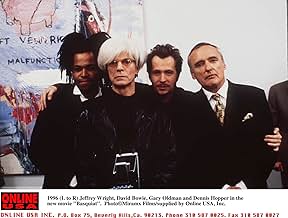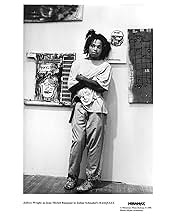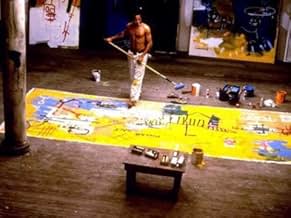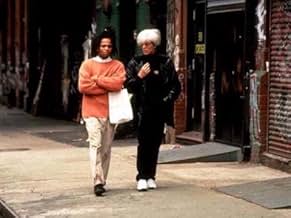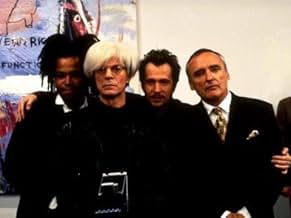La breve vida de Jean Michel Basquiat, un artista callejero de Nueva York de renombre mundial que lucha con la fama, las drogas y su identidad.La breve vida de Jean Michel Basquiat, un artista callejero de Nueva York de renombre mundial que lucha con la fama, las drogas y su identidad.La breve vida de Jean Michel Basquiat, un artista callejero de Nueva York de renombre mundial que lucha con la fama, las drogas y su identidad.
- Dirección
- Guionistas
- Elenco
- Premios
- 2 premios ganados y 3 nominaciones en total
- Shenge
- (as Jean Claude LaMarre)
- Tom Kruger
- (as Chuck Pfeifer)
Opiniones destacadas
I can't pretend to understand art. So I can't say I understand what makes one artist valuable or famous and another one nothing. Basquiat is one of those mysteries. What made his art special? I do not know. But his life was interesting, and the way this film challenges race is important. I have wondered why we distinguish "black" things, but not "white" things...
And Andy Warhol. Wow. I don't know a lot about him, but if he was anything like what David Bowie portrayed, he must have been quite strange to be around. No doubt Bowie and Warhol met, so the portrayal is probably correct.
Hogwash. Art will always be in the eye of the beholder, and unless you hear it from the horse's mouth, nobody knows what is going on in the head of anyone else. Take a look at Julian Schnabel's most recent work "Before Night Falls," and subject it to the same analysis. The only reason we might know more about Reinaldo Arenas is because he wrote it down...the motives are not always as clear as we might hope to believe we have grasp of...
How about Jackson Pollack? How many of us know that the "Wizard of Oz," an apparently simple, innocent childhood fable, was actually a political statement of the author (and this is from the "horse's mouth")?
Take the film for what it is and don't spend your time looking for the boom mic to peek into shots or read Basquiat's mind and you might find it enjoyable. For the art critics out there, let us not pretend to understand the process unless you are somewhat of an artist yourself, okay. Because you cannot understand the motive does not change the fact it may exist on some other plane than we perceive. Okay, off of my soap box!
Directors and scriptwriters be damned; you spoil otherwise good movies. Just when will film-makers get over their homophobic paranoia? Why make a movie about Howard Hughs and not mention he had bedded most Hollywood leading men of his day? Why make a movie about Alexander the Great misrepresenting his life-long male lover and companion, and not mentioning his Persian male lover? Why make a film about Archilles and pretend that his male lover, whose death caused his downfall, was his platonic cousin? Why make a movie about Cole Porter and not mention anything? The list goes on.
I am not saying that this is (or is not) the truth. In the world of art there are no truths anyway. What I am saying is that this is not a neutral biography. It may pay to do a little bit of research into Basquiat before watching the film. As for myself, I admit to watching it only because I was bored and nothing else was on. I knew vaguely the story, and who Basquiat was, but had no opinions of and no real knowledge about him. Since I am not the type of person who forms his opinions on any subject based on information from only one source, I did some research into Basquiat after the film before coming to any sort of conclusions. What those conclusions were are irrelevant as far as this review is concerned - but what does concern me are the many people who undoubtedly had their opinion about Basquiat fed to them by this film and who now consider themselves educated on the subject.
As far as the film itself, it is not bad. Not great, but not bad. It had a certain feeling to it. But it is hard to get beyond its portrayal of the subject, as he is the reason for the film. As noted, Basquiat comes off as an empty headed and shallow individual without a lot of talent or original thought who likes to use drugs and drink a lot. The film's Basquiat seemed not to care much about art, that it was an afterthought to him. He was shown as a dabbler - dabbling in music too but not doing much or giving it much effort. Perhaps that is the truth, I don't know, because overall the film is more a study of art and what constitutes it and gives it value than a biography of an artist - and postulates that today's art is more about the name than the actual piece. The same thing that is given away for free by a homeless man who lives in a box can be worth six figures if the right people decide that it should. I also felt that he filmmakers relied on cliché' a bit too much for my liking. The scene that sticks out in my mind is the one where Basquiat was on a schoolyard basketball court with his buddy, who was trying to get him to play. Basquiat was totally inept at the game and had no desire to play whatsoever. The filmmakers were obviously trying to demonstrate either one or both of two things - that Basquiat was so much of a cerebral artist that he was incapable of physical sport, or that Basquiat was a black man who could not play basketball. Whatever the case, the scene was painful to watch. It was ham-fisted imagery at its worst. A well done scene with some good conversation and emotion could have sent the same message intended in the schoolyard - actually could have done it better because as blockheaded as the schoolyard scene was, it still did not send a clear and defined message.
The acting in Basquiat was for the most part serviceable, with David Bowie turning in the most inspired performance as Andy Warhol. Bowie brought a subtle warmth and humanity to a person who is often portrayed as a cold cartoon character. Although Warhol was clearly intended to be an exploiter in the film, Bowie managed to show him as a person who felt that Basquiat was a true friend and not just a paycheck. This is an Andy Warhol who cared about people, and who could have his feelings hurt just like anyone else. This is not the stereotypical movie Warhol, playing with people like the proverbial chess pieces. This Warhol genuinely admired the work of his protégés. And David Bowie would know, wouldn't he? He was there. I got the feeling that Bowie took the part to make a statement about Warhol - as if he was annoyed by younger filmmakers using the stereotypical Warhol image in an exploitative way. I felt that he was subversively reading the lines between the lines. Good for him.
This film is more a commentary on the art world, on racism, and on exploitation than it is a biography. I would say that it is better to look at it this way, for as a biography it is biased and somewhat mean-spirited. Remember the first line of this review? It seemed to me that the filmmakers were saying that Basquiat was bereft of talent and inspiration - that he was a bum and a drug abuser who got lucky. Perhaps he was, but I'd prefer to make up my own mind. So it would pay to know a bit about the subject before watching - this Basquiat is a light dessert, not the main course.
Intricately performed and written, this film is "art-house" & "independent" at it's very finest. David Bowie is perfection as Jean Michel Basquiat's friend and mentor, Andy Warhol. Michael Wincott sheds his usual grovel-voiced tough guy persona to play Basquiat's first flamboyantly feminine art dealer. Jeffrey Wright's brilliant performance as the complex Basquiat received a nomination for "Best Debut Performance," and Benecio Del Toro won "Best Supporting Male Performance" at the 1997 Independent Spirit Awards. Even the minor characters (Gary Oldman, Christopher Walken, Dennis Hopper, Parker Posey, Willem Dafoe) add colorful performances to Julian Schnabel's first "canvas on film." --J.B.
¿Sabías que…?
- TriviaThe estate of Jean-Michel Basquiat refused to allow his works to be used, so the director, Julian Schnabel, personally painted the reproductions which are used throughout the film.
- ErroresAs Basquiat walks with Gina for the first time, a woman is seen behind them walking a dog on a retractable leash. Retractable leashes were not available in 1981.
- Citas
Rene: What is it about art anyway that we give it so much importance? Artists are respected by the poor because what they do is an honest way to get out of the slum using one's sheer self as the medium. The money earned, proof, pure and simple, of the value of that individual, the artist. The picture a mother's son does in jail hangs on her wall as proof that beauty is possible even in the most wretched. And this is a much different idea than fancier notion that art is a scam and a ripoff. But you can never explain to someone who uses God's gift to enslave, that you have used God's gift to be free.
- Créditos curiososAt the very end of the credits, a short clip showing a surfer riding on a wave is displayed. It's very similar to the surfing/wave shots that Basquiat keeps seeing whenever he looks up to the sky during the movie, but it's in full color instead of being blue-tinted.
- Versiones alternativasIn 2024, the film was remastered in 4K, with a new, director-approved version in black-and-white. This version was released a year later on UHD-BD by The Criterion Collection, along with the original, color theatrical version on Blu-ray.
- Bandas sonorasFairytale of New York
Performed by The Pogues
Written by Shane MacGowan and Jem Finer (as Jim Finer)
Published by Perfect Songs/MacGowan Music/SPZ Music, Inc.
Courtesy of Warner Music UK Ltd.
By Arrangement with Warner Special Products
Selecciones populares
- How long is Basquiat?Con tecnología de Alexa
Detalles
Taquilla
- Presupuesto
- USD 3,300,000 (estimado)
- Total en EE. UU. y Canadá
- USD 3,046,399
- Fin de semana de estreno en EE. UU. y Canadá
- USD 83,863
- 11 ago 1996
- Total a nivel mundial
- USD 3,046,785
- Tiempo de ejecución1 hora 47 minutos
- Color
- Mezcla de sonido
- Relación de aspecto
- 1.85 : 1
Contribuir a esta página



